| Please consider adding [email protected] to your address book, which
will ensure that our messages reach you and not your spam box.
Read and share online: https://www.fsf.org/blogs/community/libreplanet-day-two-empowering-users-in-real-and-virtual-space
Dear Free Software Supporter,
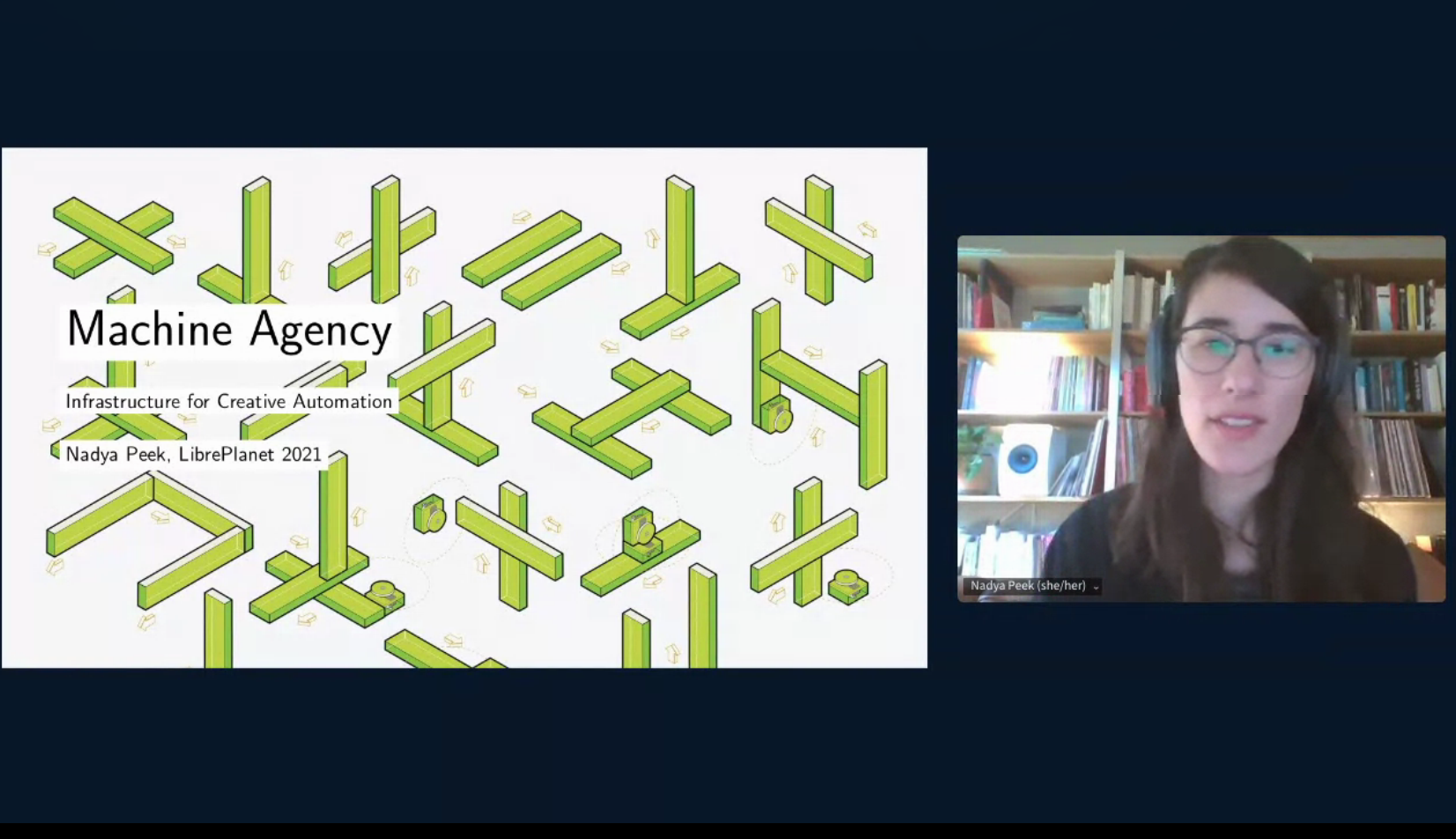
The second day of the LibrePlanet 2021 conference is generally a
calmer time for us here at the Free Software Foundation (FSF),
because while there are still a lot of moving parts to
manage (and here’s where I ask you to give a big round of
applause to our tech team!), we’ve gotten to test out most of our
plans and find, with relief, that everything is running smoothly
and our guests are enjoying themselves. The Web sites work, the
talks are running with not too much in the way of technical
difficulties, attendees from all over the world are having a
grand time socializing on LibreAdventure, we’ve given out Free
Software Awards and announced a new ebook initiative,
and now we can take a deep breath and just enjoy attending the
conference a little.
It’s also been nice to get feedback about how well the all-online
conference has gone, and how much people are enjoying the
opportunity to watch and participate all over the world. The
morning keynote speaker, digital fabrication expert and
University of Washington assistant professor Nadya Peek,
started off her talk by mentioning that she had attended
LibrePlanet in past years, which was convenient because she lived
in Boston, but this year, it’s quite convenient to attend from
elsewhere as well. Free software programmer Martin Owens, who
gave the talk “Empower users by asking them for money” today,
told me that the LibreAdventure setup has him “looking forward to
the future of the online conference,” and suggested that we use a
similar social program again in future years alongside in-person
attendance.
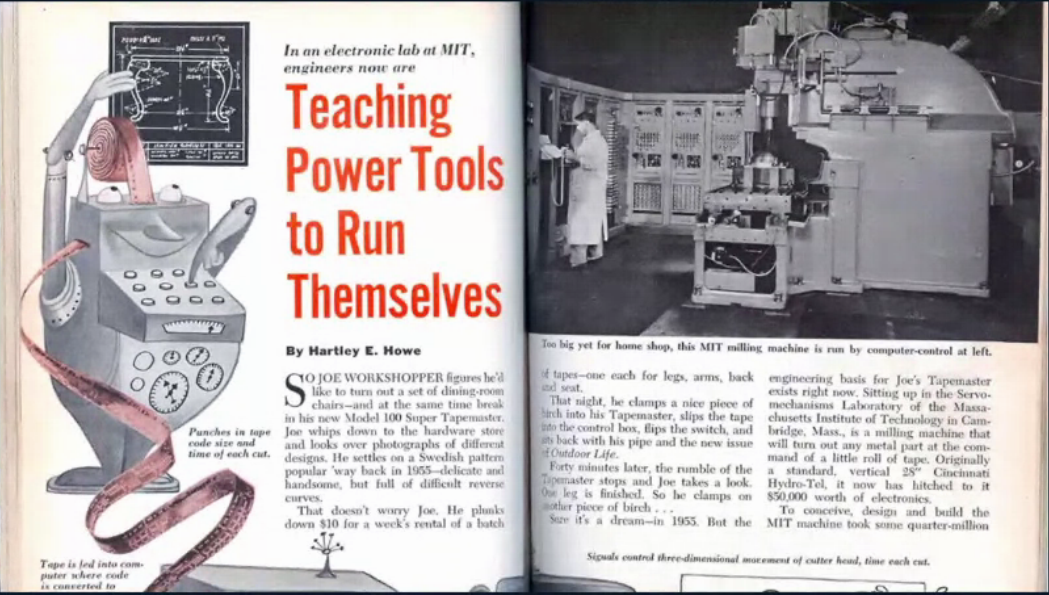
Despite some minor technical hangups, Nadya’s keynote talk was a
thought-provoking highlight, which compared the ways that we make
and use software, yesterday and today, with the way we make and
use physical objects, and what the barriers and possibilities are
for bringing a makerspace into every home. She started by talking
about how historically, computers started out as gigantic
machines that filled an entire room, which took a lot of money to
build and run, but now, we have laptops and smartphones. Could a
machine that makes other physical items be reduced to the size of
a laptop?
The problems that need to be solved along the way are very
different -- there isn’t a clear road to making Star Trek-style
replicators just yet, but Nadya’s work has endeavored to lower
the threshold to machine building, and the whole talk was a
really fascinating step back into thinking about how things are
made, and the interplay between the worlds of software and
hardware. We’re planning on having videos of all of the
LibrePlanet 2021 talks up on our GNU MediaGoblin and
PeerTube pages in just over a week, and this video will
be a must-see.
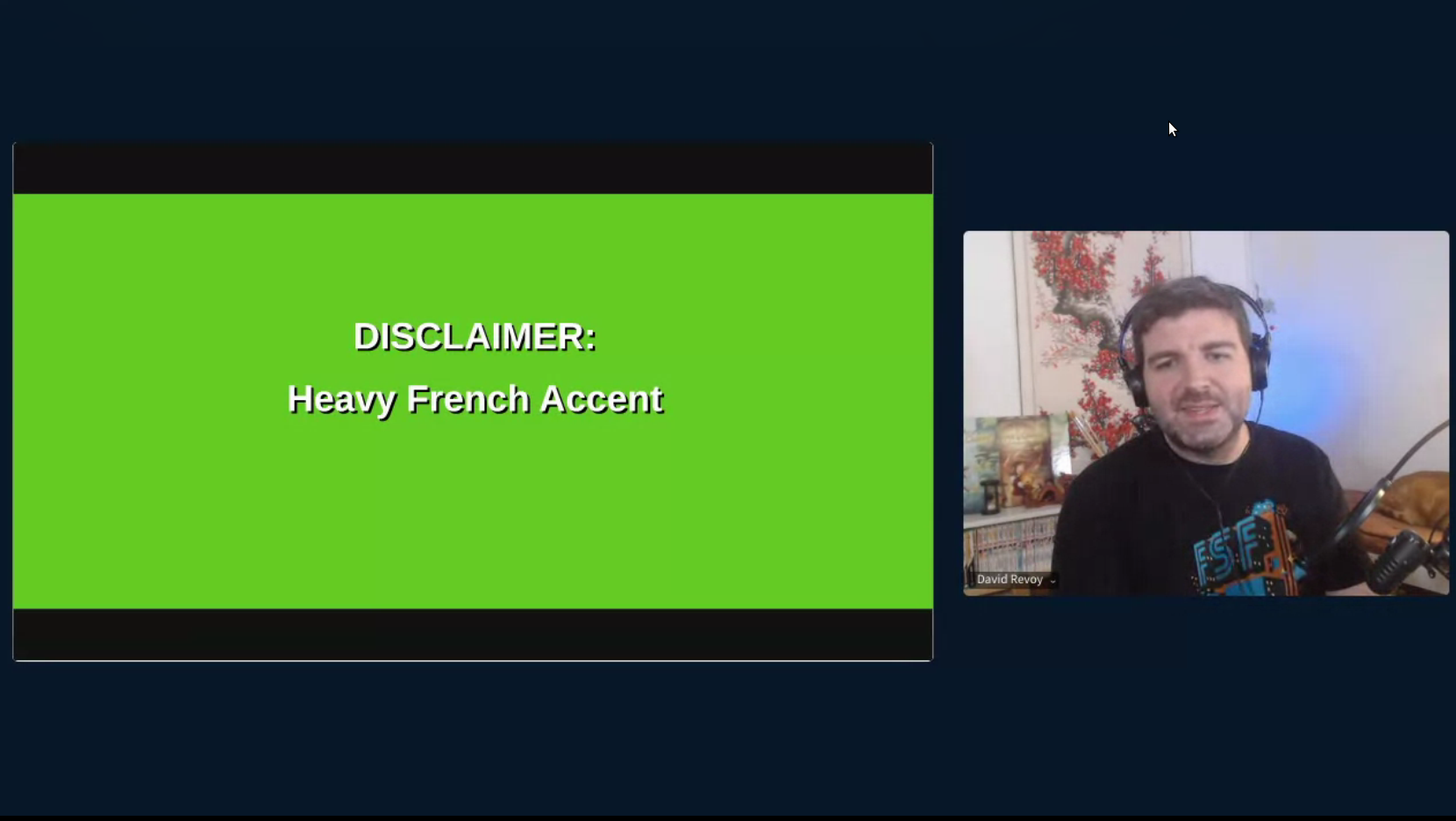
Another highlight of Sunday morning was “How to free the
imagination,” with the artist David Revoy, who was of course
wearing one of the wonderful shirts he designed for the FSF’s
35th anniversary celebration last year. As an artist who
exclusively uses free software to create and distribute his
Pepper and Carrot webcomic, he applies the free software
philosophy to his creative efforts beyond the screen, and has
important insights on how art should be shared, remixed, and/or
commercially reused. One takeaway that I’m going to be mulling
over for quite some time is how, because proprietary, commercial
entertainment properties are so massive and have colonized our
imagination so thoroughly that pretty much any character or story
you think you’ve created originally could be said to be fan art
or fanfiction. And if you don’t have the right to create and
share these putative derivations, do you have the right to create
or share anything at all?
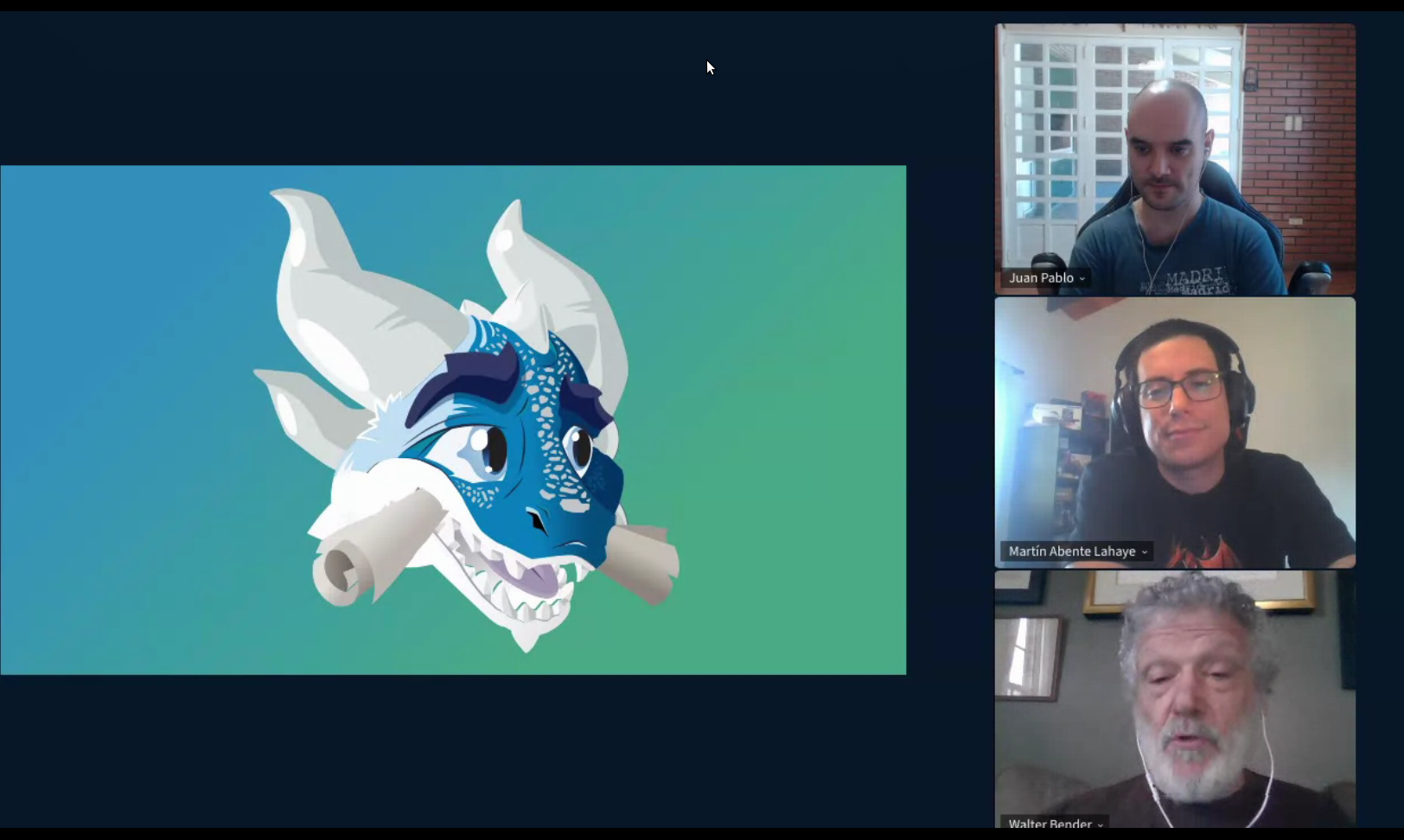
I also spent some time watching Walter Bender, Martín Abente
Lahaye, and Juan Pablo Ugarte introducing Ingestum, a free
Natural Language Processing (NLP) document ingestion library that
they chose to introduce to the world for the first time today, at
LibrePlanet! Walter is the founder of Sugar Labs, and has
given several LibrePlanet talks and workshops in the past on
their Music Blocks free educational software program, but
Ingestum is a rather different kind of program: it’s designed to
replace proprietary programs that can “devour” sources of text in
order to analyze them for NLP projects. I’m not a particularly
technical free software enthusiast, just a writer on the subject,
but an NLP talk was one of my favorites at the 2019 SeaGL
conference, and I’m excited to see what Ingestum’s free
digestive process can produce.
Today also brought to the stage representatives from some very
important partners to the FSF in the free software movement. This
afternoon, Bill Budington from the Electronic Frontier
Foundation (EFF) explained the EFF project “Panopticlick” in his
talk “An information theoretic model of privacy and security
metrics" -- and we’re also grateful to our friends
at the EFF for being one of the generous event exhibitors,
and chatting up our guests in our virtual exhibit hall. Free
Software Foundation Europe (FSFE) also made another appearance,
with their president, Matthias Kirschner, delivering a talk on
their “Public Money? Public Code!” campaign. It’s a
straightforward-enough concept: if the government uses public
money to fund the development of a piece of software, then the
public ought to have free access to it, in accordance with the
four freedoms. Matthias shared a very useful animated video on
the campaign, and talked about how free software advocates
throughout Europe are banding together under this framework --
and you can, too!
I didn’t get to watch the afternoon talk with Public Invention
founder Robert Read and FSF pro bono lawyer Marc Jones, talking
about Public Invention’s work with free solutions for the
ventilator shortage caused by the COVID-19 pandemic, but I have
no doubt that this will also be a video you’ll want to check out
when they go live. The free software and hardware
movements have so much to contribute to the democratization of
access to health care and other human needs, and we tried to make
our own contributions to this effort through our HACKERS and
HOSPITALS initiative -- I know that Robert and Marc have
some really valuable insights. The talk abstract they gave us
noted that “The overall effect was mixed in terms of its success
developing ventilators, but very successful in advancing the
global free hardware community” -- and the latter is very, very
good news.
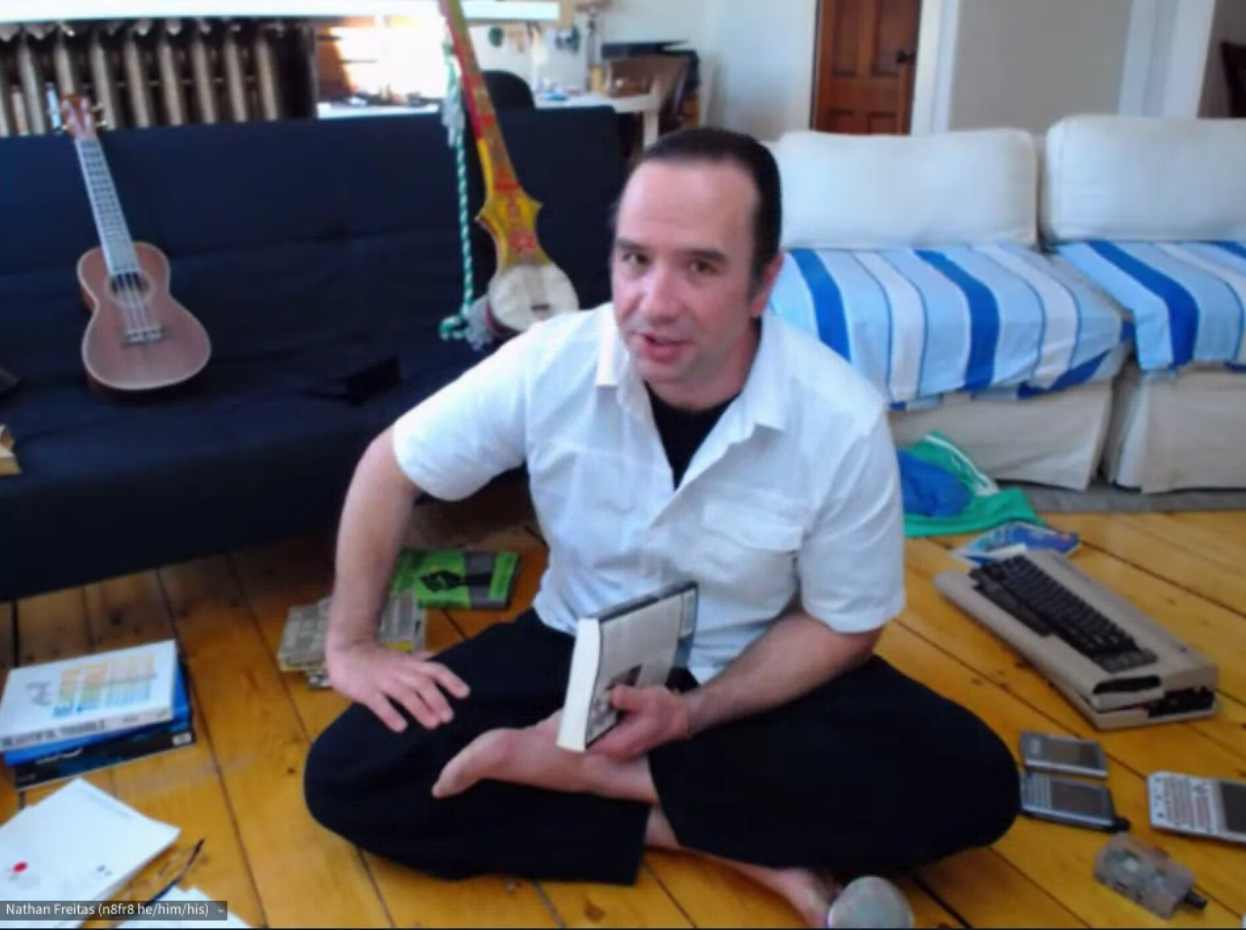
The day ended with a final keynote from Guardian Project founder
and director, Nathan Freitas. Nathan delivered his talk from his
living room floor, and started his talk off with a show and tell
session, with ancient Palm devices and plenty of his favorite
books about technology and activism. The informality and intimacy
of the talk underscored that our relationship to technology is
highly personal: technology does so much to steer the course of
our lives, and we deserve the right to control that technology.
Finally, an address from the FSF staff ended the official part of
the conference, when all participants were asked to join the
stream to crash the server, a suitable and fun goodbye to an
amazing weekend. The event got over 1,250 registrations, welcomed
at least 450 attendees at once at the highest point, and saw up
to 350 different explorers in LibreAdventure alone. We also have
some impressive Minetest artworks to commemorate the
experience. We owe tremendous thanks to all of our attendees, our
speakers, and our generous sponsors and exhibitors: Red Hat,
Vikings, EFF, openSUSE, Sugar Labs, No Starch Press, and
Bitfolk. And we hope we'll see you -- in the real world or the
virtual world -- at next LibrePlanet.
In solidarity,
Dana Morgenstein
Outreach & Communications Coordinator
Screenshots Copyright © 2021 Free Software Foundation, photos licensed
under CC-BY 4.0.
|